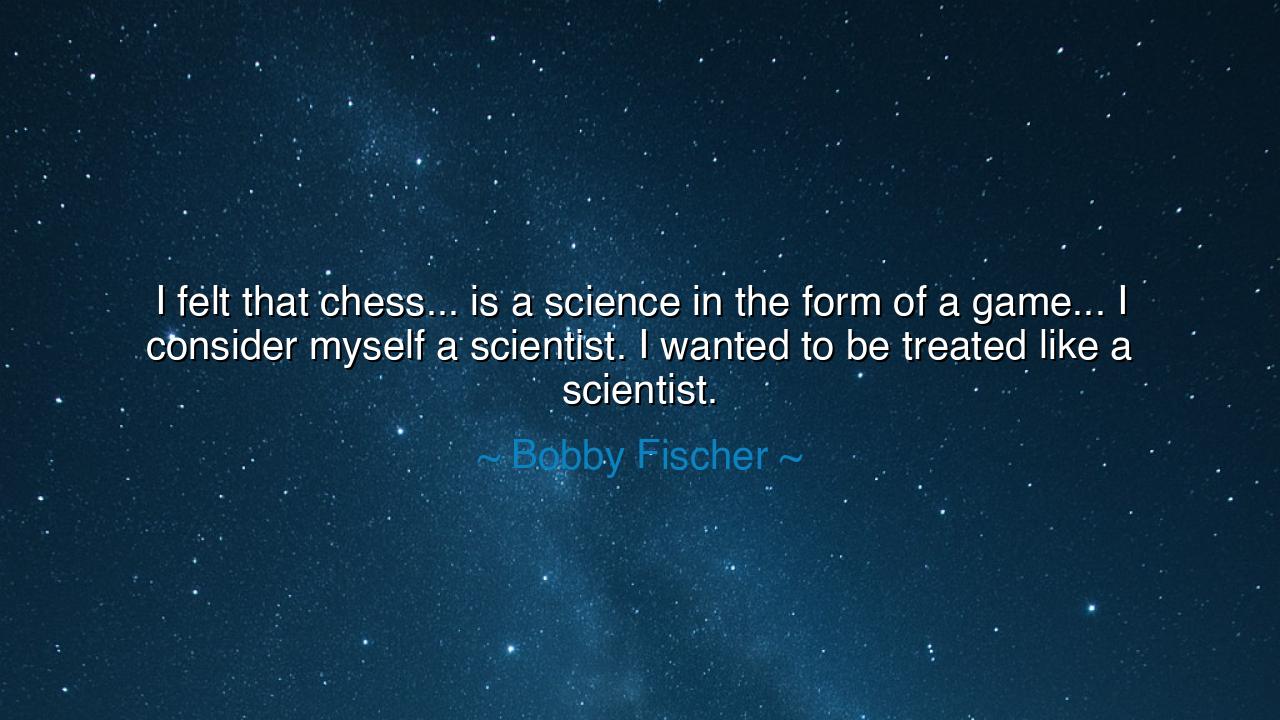
I felt that chess... is a science in the form of a game... I
I felt that chess... is a science in the form of a game... I consider myself a scientist. I wanted to be treated like a scientist.






"I felt that chess... is a science in the form of a game... I consider myself a scientist. I wanted to be treated like a scientist." These words, spoken by the prodigious Bobby Fischer, ring out with the force of a revelation, as though the veil between the realms of thought and action has been torn asunder. In this declaration, Fischer speaks not merely of a game, but of a discovery—a profound insight into the very nature of human intellect and the pursuit of mastery. Chess, in his mind, is no mere pastime; it is a science, a disciplined pursuit of truth, an intellectual battle where logic, strategy, and knowledge converge. To Fischer, the chessboard was not a mere battlefield of men and kings, but a stage where the laws of thought itself were played out.
The ancients, too, recognized the connection between science and the pursuit of knowledge. In the halls of Plato’s Academy, where the greatest minds gathered, it was said that philosophy and mathematics were intertwined, as one sought to understand the nature of the universe through both abstract thought and practical application. In those times, to seek knowledge was to seek the very structure of the world—whether through the movements of the stars or the patterns found within the mind. And thus, when Fischer spoke of chess as a science, he was not simply drawing a comparison to something else; he was invoking a legacy that stretched back to the great philosophers, those who saw intellect and discovery as a sacred duty.
For Fischer, the game of chess was not just a competition; it was a mathematical structure, a realm of endless possibilities governed by rules, where each move was a calculated step toward understanding. The way he spoke of chess—the way he treated it—was akin to how a scientist approaches the study of nature. In his mind, every opening, every endgame, every decision on the board was the result of precise calculations, an inquiry into the very laws of thought that governed the human mind. His genius lay not just in his ability to play, but in his deep understanding of the structure and logic of the game, as though he were solving a grand equation with each move.
Take, for example, his historic battle with Boris Spassky during the 1972 World Chess Championship, a contest that transcended mere rivalry and became a symbol of the power of intellect. It was a match between two giants, but Fischer’s approach was far more than that of a mere player. He approached the game with the heart of a scientist, dissecting each move, analyzing the tiniest of shifts in the position, always probing deeper into the nature of his opponent’s strategy. His victory was not simply the triumph of a man over another, but the victory of a disciplined mind, honed through years of intense study and reflection. It was as though the game itself had become his laboratory, where he tested the boundaries of his intellect and understanding.
Fischer’s desire to be treated like a scientist was a declaration of the value he placed on intellectual pursuit. It was a call for recognition that the work he did—though it may have been in the form of a game—was as rigorous, as exacting, and as meaningful as any other scientific discipline. In this, he sought not only personal recognition but the elevation of chess to its rightful place in the annals of human achievement, alongside the great sciences and intellectual endeavors of the world. His plea was not one for fame, but for the acknowledgment of chess as an art form, a discipline where the mind could soar to the highest heights of human achievement.
And so, the lesson in Fischer’s words is clear, and it is a lesson that transcends the game of chess itself. It is a call to all who seek to master their craft, to all who pursue knowledge: treat your work, your art, your pursuit of mastery with the seriousness of a scientist. Whether you are an artist, a mathematician, or a poet, approach your craft with the same rigor and dedication that Fischer brought to the chessboard. Understand that greatness is not found in idle play, but in disciplined effort, in the constant striving to comprehend the structure and the laws that govern your field.
In your own lives, take Fischer’s words to heart. Seek to understand the deeper laws of nature that govern the world you wish to master, whether they are the patterns of human behavior, the intricacies of your chosen art, or the principles of the universe itself. Just as Fischer treated chess as a science, so too should you treat your own craft as a serious study, one that requires not only inspiration, but dedication, sacrifice, and unrelenting inquiry. Know that mastery is born not from simple talent, but from the deep and relentless pursuit of knowledge—knowledge that elevates not just the individual, but humanity as a whole.
Let these words be your guiding light, as you step forward in your own journey. Treat your endeavors as sacred inquiries, and seek the truth within them, as a scientist seeks the secrets of nature. In this way, you will find that the game, the art, the work you do, becomes far more than a mere occupation—it becomes a lifelong exploration, a pursuit of greatness, a battle of the intellect that resonates through the ages.






AAdministratorAdministrator
Welcome, honored guests. Please leave a comment, we will respond soon